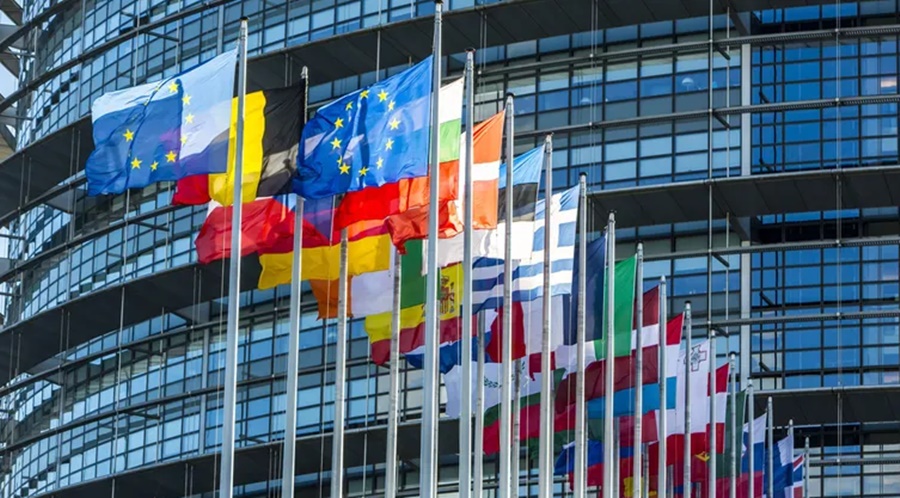New EU rules hit Apple, Google and Facebook hard
With two laws, the EU is showing the big Internet companies their limits.

For consumers, these bring great benefits for everyday life.
The European Parliament passed two laws today, with which the European Union wants to set limits for the major providers on the Internet. Google, Apple, the meta group with Instagram, Whatsapp and Facebook, like TikTok, should have more obligations. Failure to follow the rules could result in fines running into the billions. For users, there are some important improvements in both laws.
For the EU, the package is one of the biggest changes to internet legislation in almost 20 years: the EU Parliament, EU Commission and member states have been negotiating the Digital Markets Act and the Digital Services Act for a year and a half. While the Digital Markets Act is intended to make competition law fit for the digital age, the Digital Services Act regulates the obligations of providers and the rights of users.
With the laws, the EU wants to ensure that all companies operating in Europe act in accordance with the law. “The big platforms will have to adapt to our rules and not the other way around,” expects EU Digital Commissioner Thierry Breton. Both laws will apply in all EU countries from 2024.
Digital Markets Act: Apple, Meta, Microsoft and Co face high penalties
The decision-makers in Brussels are targeting the particularly large digital companies such as Apple, Meta, Google, Amazon or Microsoft with the Digital Markets Act. In the future, the EU Commission should directly check whether companies are abusing their market power. The rules for when this is the case are being adapted to the digital age. “The EU is leading the way as the most important legislator and regulator,” said CDU MEP Andreas Schwab in Parliament on Monday evening.
What sounds like dry EU legislation is also supposed to improve the lives of Europeans in a very practical way: In the next four years, all particularly large providers of short message apps such as Whatsapp or Telegram will have to change their systems so that they are also compatible with other providers .
Then, for example, Whatsapp users should be accessible from Telegram, Signal or Threema. First by text messages, but then also for voice messages and finally also for video calls. “Parents no longer have to sell their souls just because they want to be part of the parents’ chat at their primary school,” says René Repasi, SPD MEP.
The EU law could also bring very practical changes elsewhere: Until now, for example, smartphones from one manufacturer have often been fully equipped by one provider. Android phones are usually linked to Google user accounts, while Apple’s phones, iPads and computers can hardly be used without the Cupertino-based manufacturer’s app store. Such forced uses can be banned in the future.
“The Digital Markets Act is certainly not a toothless tiger,” says Justus Haucap, economist and competition expert at the University of Düsseldorf to t-online. Much now depended on how the Commission would enforce the rules. “The corporations will take the rules very seriously because of the threat of penalties,” says Haucap.
The penalties are hefty: If a company does not comply with the Digital Markets Act, up to 10 percent of a company’s global annual turnover may be due. At Apple, that would currently be around 35 billion euros, at Meta over 11 billion euros. Haucap urges patience: “One should not expect that the dominance of the corporations will be broken in just six months.”
Digital Services Act: New rules for Facebook, TikTok, Insta and Telegram
The second major law is primarily intended to provide more clarity: the English DSA abbreviated law prescribes many specific rules for online offers, marketplaces and social media platforms. This applies above all to dealing with content and offers that may be illegal – such as fake offers on online marketplaces. In the future, they should be sorted out faster and better by providers.
However, the basic principle remains: the providers do not have to constantly search for illegal content themselves. As soon as others inform them of a corresponding suspicion, they have to take action. This also applies to Facebook, Instagram, Twitter, TikTok, Telegram or Youtube. The Digital Services Act is also changing the rules for these platforms. This is intended to better counteract disinformation, for example, but also hate speech, i.e. threats relevant to criminal law.
While in Germany the controversial Network Enforcement Act has so far regulated how providers deal with potentially illegal content, the EU Digital Services Act will take effect from 2024. The major social media platforms will then have to comply with uniform rules across Europe on how to moderate content and comments.
“Now there’s a new sheriff in town.”
So-called trustworthy notifications play a special role: These can be authorities such as the police or youth protection authorities or other institutions. Their reports then have to be processed particularly quickly. A second innovation: if a user unfairly removes content or feels unfairly blocked, the providers must offer a way for users to have the platform’s judgment checked. The German Network Enforcement Act did not provide for this until now.
It is currently difficult to predict how the new laws will work in practice. It is still unclear how many staff the EU Commission will actually have available to enforce the new laws. The CDU politician Andreas Schwab called for 150 employees in Parliament, just for the Digital Markets Act. Because it is foreseeable that the EU Commission will have to prepare for lengthy legal disputes with the large companies and their law firms.
For the responsible politicians, however, the matter is clear today. “The digital has developed like the Wild West and the biggest and strongest determine the rules,” says Christel Schaldemose, who negotiated the Digital Services Act for Parliament. “But now there’s a new sheriff in town.”




